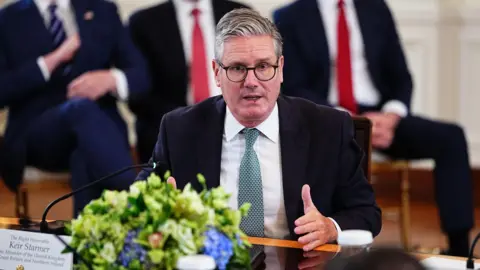In a significant development regarding international relations and security, UK Prime Minister Sir Keir Starmer has praised US President Donald Trump’s commitment to providing security guarantees to Ukraine, deeming it a pivotal “breakthrough.” This declaration comes in the context of heightened diplomatic activity aimed at facilitating a meeting between Ukrainian President Volodymyr Zelensky and Russian President Vladimir Putin. Starmer’s optimism about the direction of these discussions suggests a crucial shift in the ongoing geopolitical landscape of Eastern Europe.
Sir Keir Starmer, having recently attended a leaders’ summit at the White House, chose to truncate his family vacation in Scotland to participate in these crucial talks. The decision indicates his recognition of the importance of the discussions surrounding Ukraine’s security. Starmer is now set to convene a virtual summit of European allies—dubbed the “coalition of the willing”—to deliberate on the next steps and coordinate responses in light of developments following the White House meeting.
During this summit, Starmer expressed a sense of satisfaction regarding the progress made thus far in Ukraine’s dealings and the broader international response to the crisis. He aims to address the anxieties lingering among UK government circles related to Ukraine’s future amid ongoing tensions with Russia. Post-meeting, he emphasized the achievement of moving forward with significant progress—a test he sees as crucial in evaluating the effectiveness of the collaborative efforts to stabilize Ukraine.
However, not all is without concern; European officials reportedly approached the White House discussions with trepidation. They feared that the meeting could expose divisions among leaders regarding their commitment to Ukraine’s autonomy, particularly in light of Trump’s communications. The apprehension was that if Trump perceived any waning commitment from Zelensky toward a US-led peace process, it might reinforce negative perceptions that could benefit Moscow. The necessity of portraying a unified front against external threats is well recognized among the leaders involved.
Starmer and other European leaders were keen to dispel any notions of disunity, portraying an image of solidarity and collaboration. At the conclusion of the Washington discussions, Starmer remarked on the tangible sense of unity present between the participants. He voiced his contentment with advances in security guarantees that he believes will bolster confidence within Europe and within Ukraine itself.
Another significant takeaway from the discussions was the outlined strategy around negotiation preparations. UK officials are reportedly working towards establishing a strong negotiating position for Ukraine for any future peace talks. One noteworthy aspect emphasized during the talks was Trump’s indication that he would refrain from echoing Putin’s demands regarding territorial concessions from Ukraine. This shift opens the door for Ukraine to navigate sensitive discussions without undue pressure, reinforcing the Ukrainian leadership’s position that issues surrounding territory are solely for Ukraine to decide.
Flexibility in negotiations is deemed crucial by UK officials, especially considering the firm commitment made by Trump to provide “cast iron” security guarantees to Ukraine. This assurance implies that Zelensky can adopt a more adaptable stance in talks, knowing that he has robust support from allies.
While hopes for a pre-negotiation ceasefire seem to have dimmed—as Trump seems inclined to proceed directly to peace terms—the discussions highlighted the need for nuanced approaches, especially following stern remarks from notable figures like German Chancellor Friedrich Merz and French President Emmanuel Macron. The UK government remains cautious, relaying clarity that decisions regarding Ukraine should be made with direct input from Ukraine itself.
As the UK emphasizes cooperation with the US and other European allies, the response to Putin’s actions remains unanswered. Observers are acutely aware of the potential for Moscow’s next steps, with speculation that Putin could retreat from the emerging peace pathway. Should that occur, the hope persists that the US aligns with Europe, standing firm against a Russian narrative that seeks to disrupt the collaborative efforts underway.
In conclusion, the dynamics surrounding Ukraine’s security guarantee discussions reflect a complex juxtaposition of optimism and caution as global leaders navigate towards a peaceful resolution. With Starmer steering UK relations and Trump’s US involvement, the trajectory of international negotiations continues to evolve against a backdrop of significant geopolitical challenges.











